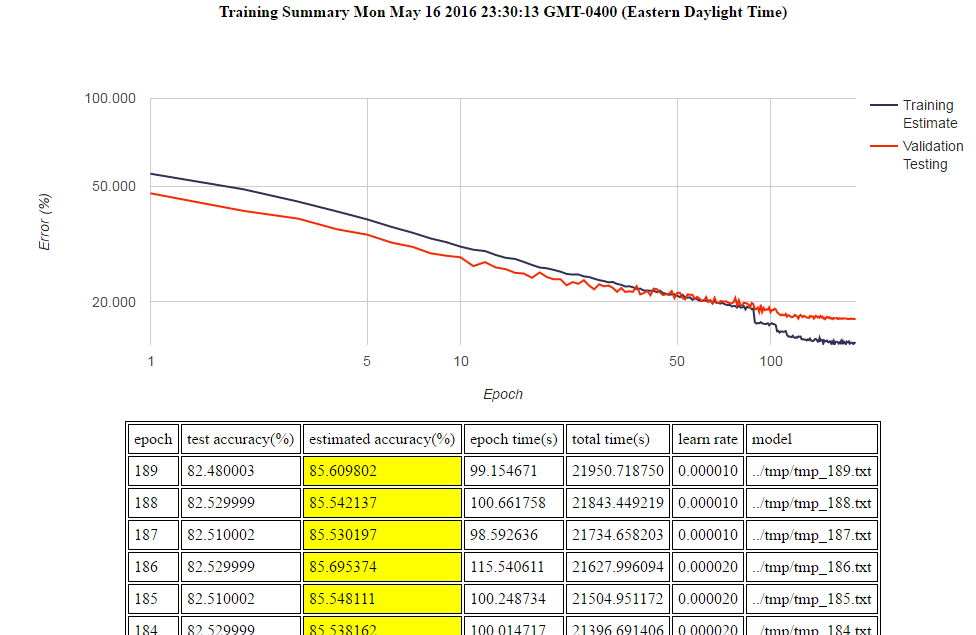Mojo is an efficient C++ CNN implementation that was built with the goal to balance hack-ability, functionality, and speed.
See the mojo cnn wiki for the latest updates.
Consisting of only a handful of header files, mojo is in portable C++ with old fashioned C tricks for optimization. Built with OpenMP and SSE3, it's speed is competitive with other CPU based CNN frameworks. Being a minimal CPU solution, it is not designed to scale over a cluster to train very deep models (for that, go with GPUs and Caffe, TensorFlow, CMTK, Torch, etc…)
The mojo cnn API provides a 'smart training' option which abstracts the management of the training process but still provides the flexibility to handle the threading and input data as you'd like (enabling real-time data augmentation). Just make a loop and pass in training samples until mojo cnn says stop. On the standard MNIST handwritten digit database, mojo's 'smart training' gives 99% accuracy in less than a minute.
Features:
- Layers: Input, Fully Connected, Convolution, Max Pool, Semi-Stochastic Pool, Dropout, Resize, Concatenation (Fractional Max Pool, Maxout-like pooling). Read more on the wiki
- Activation Functions: Identity, Hyperbolic Tangent (tanh), Exponential Linear Unit (ELU), Rectified Linear Unit (ReLU), Leaky Rectified Linear Unit (LReLU), Very Leaky Rectified Linear Unitv (VLReLU), Sigmoid, Softmax
- Optimization: Stochastic Gradient Descent, RMSProp, AdaGrad, Adam
- Loss Functions: Mean Squared Error, Cross Entropy
- Threading: optional and externally controlled at the application level using OpenMP
- Architecture: Branching allowed, multiple inputs, concatenation of layers
- Solver: Smart training optimizes parameters, speeds up training, and provides exit criteria.
- Image Support: Optional OpenCV utilities (in progress)
- Portable: Tested with MS Developer Studio 2010, 2013, 2015, and Cygwin g++ 5.3.0.
- Logging: html training report graphing accuracy and logging epochs
API Example: Load model and perform prediction:
#include <mojo.h>
mojo::network cnn;
cnn.read("../models/mojo_mnist.model");
const int predicted_class=cnn.predict_class(float_image.data());
API Example: Construction of a new CNN for MNIST, and train records with OpenMP threading:
#define MOJO_OMP
#include <mojo.h>
ucnn::network cnn("adam");
cnn.set_smart_train(true);
cnn.enable_omp();
cnn.set_mini_batch_size(24);
// add layer definitions
cnn.push_back("I1","input 28 28 1"); // MNIST is 28x28x1
cnn.push_back("C1","convolution 5 20 1 elu"); // 5x5 kernel, 20 maps, stride 1. out size is 28-5+1=24
cnn.push_back("P1","semi_stochastic_pool 4 4"); // pool 4x4 blocks, stride 4. out size is 6
cnn.push_back("C2","convolution 5 200 1 elu"); // 5x5 kernel, 200 maps. out size is 6-5+1=2
cnn.push_back("P2","semi_stochastic_pool 2 2"); // pool 2x2 blocks. out size is 2/2=1
cnn.push_back("FC1","fully_connected 100 identity");// fully connected 100 nodes
cnn.push_back("FC2","fully_connected 10 softmax");
cnn.connect_all(); // connect layers automatically (no branches)
while(1)
{
// train with OpenMP threading
cnn.start_epoch("cross_entropy");
#pragma omp parallel
#pragma omp for schedule(dynamic)
for(int k=0; k<train_samples; k++) cnn.train_class(train_images[k].data(), train_labels[k]);
cnn.end_epoch();
std::cout << "estimated accuracy:" << cnn.estimated_accuracy << "%" << std::endl;
cnn.write("mojo_tmp.model");
if (cnn.elvis_left_the_building()) break;
};
Here are the weights for the first convolution layer in the MNIST sample model, viewable by linking with opencv, and shown in the color maps gray, hot, tensorglow, and voodoo:




